Arcanum Updated Preview
Elliott Chin explores the unusual world of Arcanum, and returns with a full report.
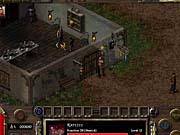
Several months ago, we brought you an in-depth preview of Arcanum: Of Steamworks and Magick Obscura, the forthcoming role-playing game from Troika Games. Troika was founded by Tim Cain, the designer of the highly acclaimed 1997 postapocalyptic RPG, Fallout. Since our last preview, we've had time to play a more finished version of the game, and we can now flesh out some of the details from our previous story. Here's a little background and updated information.
Arcanum is set in a fantasy universe unlike any other. It's a far cry from the high fantasy of a Dungeons & Dragons game, and yet many conventional fantasy elements remain intact; but moreover, Arcanum is a world where technology and magic - or magick, as it is called in the game - clash in the infancy of a new era. The world of Arcanum is at a crossroads. Magick, so long the guiding force of the universe, has to contend with an upstart discipline called technology, which threatens to make magick obsolete and change the very way the world lives. What makes the gameworld so interesting is that it is, in many ways, like the Victorian era of the 19th century. The technology here is steam technology - Arcanum is filled with lots of gears, clockworks, and huge steam-driven engines - not the futuristic gadgetry and electronics of those in a game like Final Fantasy VII. The steam technology is in its infancy, so there is a lot of new territory to be discovered. It's a "steampunk" industrial revolution that is meant to clash violently with the world's ordinary fantasy conventions. In fact, the dichotomy between magick and technology is the heart of the game, and you'll eventually have to choose to cling to the old magick or embrace this newfangled science.
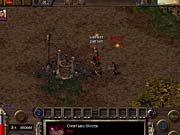
In Arcanum, you play as an individual who is the reincarnated form of a great elven hero - or so he's told by the followers of the Panarii religion. In the very beginning of the game, you are lounging in a luxurious dirigible - a sort of Victorian pleasure ship in the skies - when suddenly it is ambushed by orcs in biplanes. You are the sole survivor of the resulting crash and are found by a monk named Virgil, who not only tells you about your former life, but also implies that you have a great destiny before you. You then set out on your journey to find out who you are. It's not unlike the way Planescape: Torment and Baldur's Gate start out. In Arcanum, you also don't know who you really are (as in Torment), yet apparently you're important (as in Baldur's Gate), so throughout the game, you'll be harassed by evil cults who would rather not see this great elven hero (you) resurrected. However, you'll find that Arcanum does not play like these recent D&D RPGs and is actually more similar to Fallout.
Character Creation
Creating a character in Arcanum is a nice break from the stats rolling in some fantasy role-playing games. There are plenty of pregenerated characters for you to choose from, including prissy high-society elven spellcasters, gentrified half-ogres, and dwarven tinkerers. The assortment of races you can play is typical of fantasy RPGs - elves, dwarves, halflings, gnomes, orcs, and half-ogres. They all have various pluses and minuses. Elves, for instance, have high beauty and charisma and a penchant for magick; however, they don't have a knack for learning technology. Halflings have inherently good dexterity and sneaking skills, but they are physically weaker than other races. They can learn both technology and magick, but they aren't masters at either one. The half-ogre is by far the strongest race, but also the stupidest.
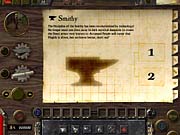
If you opt to create your own character, you start with basic stats, such as strength, intelligence, willpower, dexterity, beauty, charisma, and so on. You also have skills, which are split into four disciplines; spells; and schematics, which are the manifestations of technology. Schematics basically let you combine items together to create healing balms, guns, and sundry mechanical contraptions. During character creation and at every level advancement, you are awarded character points. You don't get a lot, but you definitely have a dizzying array of options on which to spend these rare character points. You can choose but one of the following choices per character point allotment: raise a core attribute like strength or intelligence, improve a skill, learn a new spell, or acquire a new schematic. Throw in the fact that there are eight attributes, 16 skills, 80 spells, and 56 schematics, and you'll quickly realize that there is no way you can try to master everything in this game. You have to make choices, such as whether you want to be strong or smart, whether or not you'll stick with magick, or whether or not you'll give a new technology a try.
Another interesting part of character creation is your background. In Fallout, you had traits, which had both positive and negative in-game effects for your character. With backgrounds, Arcanum achieves the same thing and lets you customize your character. There are more than a dozen different backgrounds from which you can choose to give your character. You could be a clanless dwarf and, thus, have less affinity for tinkering, but you start with a large warhammer. Or you could be "special," which means that you're mentally challenged but that people will be sympathetic to you and go out of their way to praise you when you do a good deed. Some of the backgrounds, such as "Beat with an ugly stick" and "Ran away with the circus" seem pretty funny, but they all give concrete bonuses and penalties to your character. Here is an abridged list of some of the backgrounds in the beta we played:
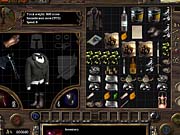
Raised by snake handlers: You are more resistant to poison, but you also suffer a beauty penalty because of numerous snakebites on your skin.
Inheritance: You inherited a large sum of money, but being spoiled made you weak-willed. Your willpower attribute suffers a penalty, but you begin with double the starting gold.
Raised by monks: You have a greater understanding of the world; thus, you have a bonus to your perception attribute, but you begin with only a quarter of starting gold.
Professional knife thrower: You get a bonus to the throwing skill, but you put your eye out in an accident, so you suffer a penalty to perception.
Bully: You were the class bully, so you have a bonus to strength. But making people do your homework has penalized your intelligence.
Magick Vs. Steamworks
Very quickly, you'll have to decide whether you want to use magick in the form of spells or science in the form of schematics - or whether you want to try to straddle the middle.
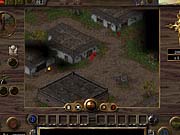
A schematic is a blueprint for designing a useful item. Each schematic requires that you find two components and combine them together to create the desired object. The schematics are divided into eight different fields. They are herbology, chemistry, electric, explosives, gunsmithy, mechanical, smithy, and therapeutics. Each field has seven levels, and they areindicated in the game by varying levels of proficiency from layman to doctor. Obviously, each field offers schematics that let you create different sorts of items. With herbology, you can create salves and medicines that can cure wounds or alleviate ailments. Explosives let you craft bullets and grenades, while gunsmithy lets you create pistols, repeating rifles, and even an elephant gun. Mechanical lets you create different traps and even robotic automatons, which are like mechanical pets and guardians. Smithy schematics let you forge heavy armor and swords, and therapeutics is the science of creating mind and body-enhancing tonics, which can enhance your dexterity, intelligence, strength, and other attributes.
You can find the components that you need for building these items on the ground, or you can buy them in stores. For example, to make the herbology field's heal lite, you need to combine ginka root with a kadura stem. Both are found in the wilderness. However, for the gunsmithy field, you need a broken flintlock pistol and small metal tube to build a crude flintlock pistol, which is the first schematic. You might find them lying in debris, or you might have to buy them from a store that sells knickknacks and used gadgets. Some schematics call for a base component plus a created item. For instance, the accelerated healing item is made by combining coca leaves and heal lite. Thankfully, you won't have to scour the world for the recipes to each schematic. Although you won't be able to build anything until you actually have a schematic in hand - either by learning one when you move up in level or by finding a schematic - the game lists each field's available schematics and the two components necessary for each schematic on the character info screen.
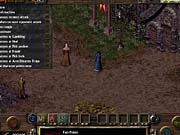
Magick is rather straightforward. Like schematics, you can learn one each time you advance in level. But there are a lot more spells than schematics. The spells are split into 16 colleges, and contain five spells each. They range from colleges such as earth, fire, air, and water to necromantic black and necromantic white to meta magick and divination. Each spell costs fatigue points to cast (Arcanum's version of mana), and each higher level of spell requires more and more of your character's stamina. Unlike in other games, though, when you run out of your spellcasting stamina, you actually need to rest - it doesn't matter if you are in the middle of combat. So if you cast too many spells, you might just collapse in the thick of combat.
We don't want to list all the spells available, but here are a few spells from a selection of colleges. The meta college provides protection spells such as resist magic, dwoemer shield, and reflecting shield. The divination college lets you cast sense alignment, sense traps, sense invisible, and more. Learn the necromantic white college, and you could cast minor and major healing and even resurrection. Poison curing is in a different college. The force college includes some of the better attack spells, such as jolt, bolt of lightning, and disintegrate.
Another consideration beyond just whether to go with magick or steamworks is affinity. Those who begin to specialize in one discipline lose their ability to use the other. If you are basically a spellcaster, a pistol or any other technology item has a chance to malfunction in your hand and not work. Conversely, even a basic heal spell might fizzle when cast on a tech-heavy character.
Questing
Arcanum definitely has depth. There are lots of nonplayer characters (NPCs) to talk to, as well as lots of dialogue. And in most cases, dialogue depends on your character and attributes. Play as a dumb half-ogre, and all you'll be able to do most of the time is nod as NPCs speak to you. In fact, your character might have only one dialogue option when you meet an NPC whom you know is a disguised enemy - to let himself be fooled. On the other hand, if you play as a canny elven noble, you'll have more conversation options and even be able to sniff out suspicious characters when they try to dupe you. Unfortunately, there were instances in which the dialogue didn't make good on the promise of variety and flavor. Although the game says that dwarves really dislike elves, our dwarven character was not shocked or dismayed when he was told that he was a reincarnated elf. For a race that opposes elves, it was an underwhelming reaction.
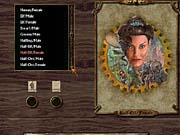
The quests in the game seem fairly typical to RPGs. When we visited the first town of Shrouded Hills after leaving the zeppelin's crash site, we had to find a Panarri leader named Elder Joachim. Of course, when we found his room, we found two dead bodies where Joachim was supposed to be, as well as a note from the Elder telling us that he had to flee some would-be assassins and that we should meet up with him at the next town of Tarant. We could have rushed to follow him and look for him yet again, but in Shrouded Hills, several quests beckoned to us. A cowardly Constable Owen wanted us to get rid of some brigands who were stalking the town's only bridge, which connected the town to the outside world. The town blacksmith wanted us to enter the abandoned silver mines to find some pure ore for some magic weapons. A foreigner named Ristezze, who owns Ristezze Imported Goods, had the information we needed on an item that we acquired at the crash site: a ring with the initials "G. B." and an imprint of "P. Schuylera and Sons." Of course, before he gave us the info we needed, we had to find some of the rare items he wanted. And so it went.
While adventuring, we noticed something interesting: fate points. Presumably, when you do a real good deed in the game, you are awarded a fate point, and during dire times, you can cash these fate points for special favors. You can use a fate point to get full healing, achieve a critical hit in battle, force your opponent's next attack to be a critical failure, make your next save against magick, or even get a free character point.
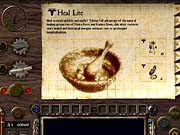
Arcanum is shaping up to be a very good role-playing game. Granted, the graphics look rather dated, and the game still isn't optimized; thus, it runs slowly - but still seems fun. The options for character building, as well as the spells and schematics, are also interesting and full of potential. The game does make you do a lot of walking around, to the same degree that it hindered enjoyment in the first Baldur's Gate. As yet, there is no way to travel via the town maps, although this could change for the final version. While you can travel via the world map, we hope that the designers will add a provision for walking across a town or a dungeon via the overhead map so that you won't have to constantly scroll and click to move across large and sometimes empty terrain.
We'll continue to play beta copies of Arcanum, so look for more information in upcoming preview updates. Arcanum is slated to be released in early 2001.
Got a news tip or want to contact us directly? Email news@gamespot.com
Join the conversation